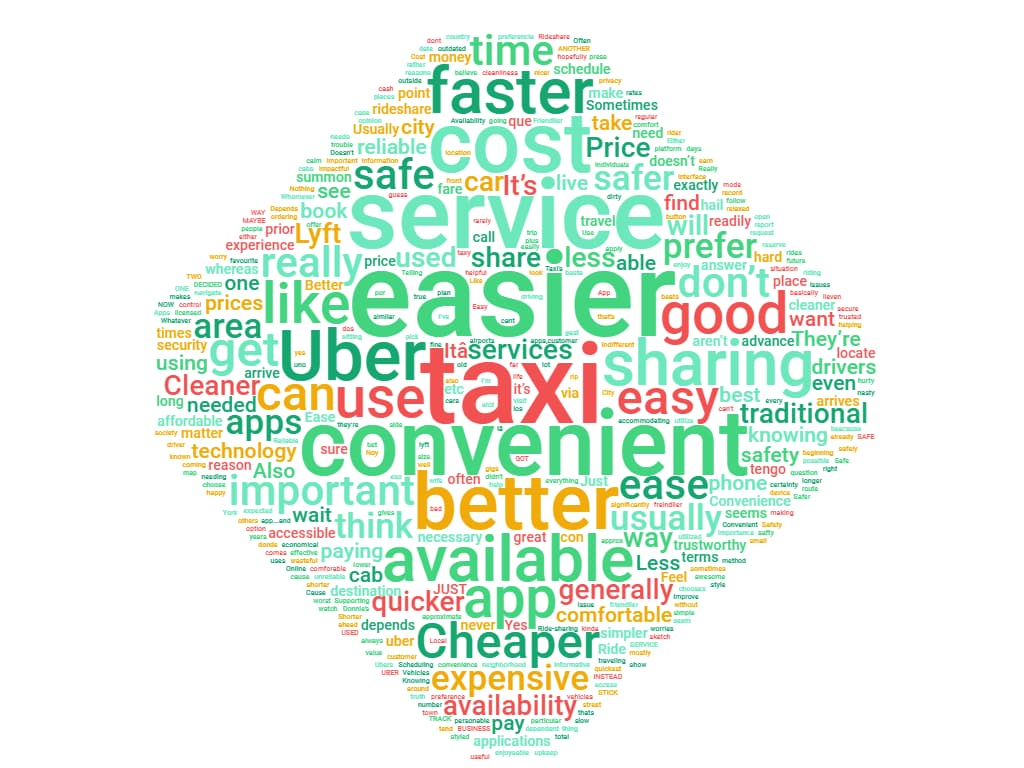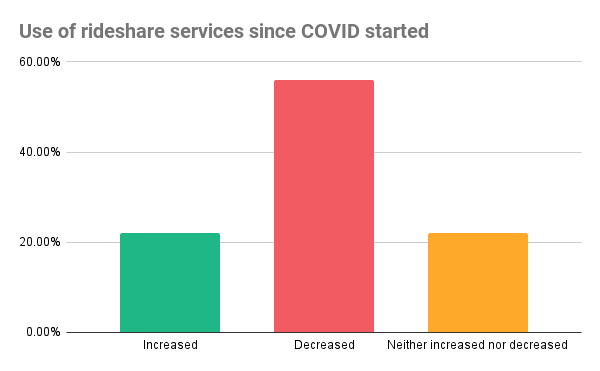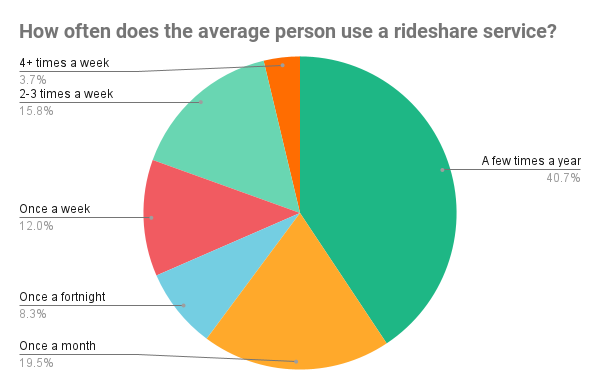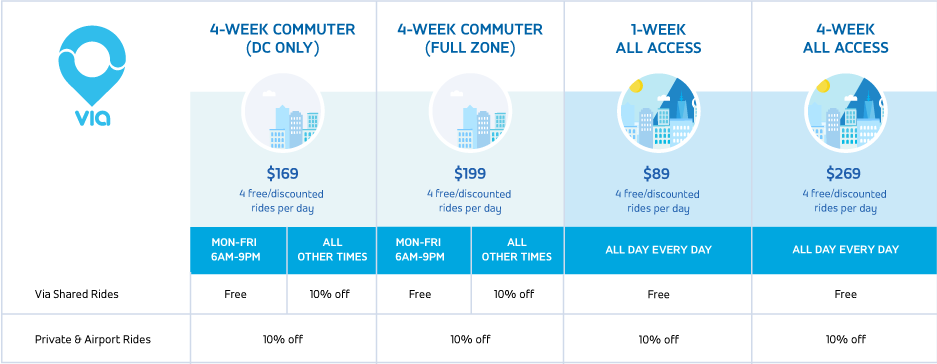Table of Contents
Long gone are the days you have to desperately hail down a cab by the side of the road, or use a phone booth to call a taxi. The 21st century is all about convenience and efficiency. In other words, we want things done fast and we want them done at the touch of a button – and transportation is no different. At Spacer, we’re on a mission to determine the best rideshare service in the U.S so we began surveying our customers, along with a plethora of your everyday Americans*, to ask them whether they’ve used rideshare services, what their favorite rideshare companies are and why they love them so much. It’s time to dive into the questions of should I use Uber or Lyft? Should I try out newer ride-hailing apps like Via? What is the difference between Uber, Lyft or any of these other services anyway? Let’s find out!
Note: We are not affiliated in any way with any of the brands mentioned. We are simply as curious as you to know which rideshare app is the cheapest, safest and most popular!
The Rideshare Awards
The People's Choice Award: Uber
Awarded for the top choice when we asked our survey pool what their favourite ride-share company is.

When we asked our survey-takers their favorite rideshare choice the answer was overwhelmingly in favor of Uber. In fact, 68% of respondents said that out of the 10 rideshare apps listed Uber was their favorite. The runner-up was Lyft, scoring 29% of votes, with the remaining handful of votes being split evenly across the other choices. When seeing the feedback on why respondents valued Uber so highly, it seemed their service and reliability stood out – as did the ease and familiarity of using their app. So – to answer the age-old question of is Uber or Lyft more popular? It seems that the data is still very much in favor of Uber, which makes sense considering their higher market share.
The Penny Saver Award: Via
Awarded for the rideshare service with the cheapest fee options available.

Cost is front and center when it comes to what makes us use a transport service. In fact, 78% of people answered value for money was very important for them. It should come as no surprise that most services now have a specific cost-friendly option for their money-conscious riders. For example, UberPool and Lyft’s Wait & Save have all become very popular alternatives to the classic options. However, for those relying on rideshare apps to get to work or as their main form of transport ViaPass was a clear winner. Fees for ViaPass vary across cities but for those looking to make two to four rides a day, paying a set price for the fortnight or month works out to be a great deal. Plus, even if you travel outside of the hours of your pass or exceed your daily number of rides, you are eligible for a discount on all of the rides that you take with Via.
The Review Blitzer Award: Scoop
Awarded for the rideshare service with the highest overall ratings across various review platforms such as the App Store, Google Play Store, Trust Pilot and more.

We looked closely at the different review sites, including the Google Play store, Apple App store, Trustpilot and more to see what the general public thought of each service. Scoop came out on top, with the highest rating on the Google Play store and the second-highest on the App store. In the reviews, it appears the aspect that set Scoop aside from other options like Uber and Lyft was the in-built matching algorithm of the app to connect them with drivers already heading to their work. Often they were even matched with co-workers, making the experience feel safer and more comfortable.
The Planet Protector: Scoop
Awarded for the rideshare company with the biggest focus on taking eco-conscious measures and offering their customers sustainable options.

There has been significant consumer pressure on traditional ridesharing services like Uber, Lyft and their competitors to do more for the environment and this has caused them to really step up their game. Now, with programs such as UberPool, Uber Green, as well as Lyft’s Bike and Scooter options, there’s a bigger push from these companies to do their part. Lyft, for example, committed in 2018 to offset the carbon emissions from all rides, and Uber has committed to becoming a zero-emissions mobility platform by 2040. Despite this, the nature of people opting for using a rideshare service over taking public transport is adding significantly to carbon emissions. Therefore, Scoop is the natural choice for this award, by matching up employees who are already driving to work with those needing to go to the same place. This eradicates the need for transportation services such as Taxi’s or Uber that add an extra car onto the road.
The Driver's Choice Award: Lyft
Awarded for the rideshare company that has the best conditions and payment for their drivers.

Naturally, there is much debate over exactly what company is the best option for drivers to make money. The answer here is changing regularly as the policies for each company get updated, as do individual cities’ regulations. Our research showed that while Uber drivers often made more just due to the sheer volume of passengers always using the app, the overall satisfaction of Lyft drivers was higher. This was cited largely due to the culture created for drivers on the app due to different features within the Lyft app itself. This includes, for example, the ability of drivers to rebut a bad review from a customer and the welcome and introduction process and incentives offered to new drivers. In addition, Lyft drivers were paid a slightly higher hourly wage as it was believed that Lyft takes a smaller cut of driver’s earnings than Uber does.
The Corporate Crown Award: Gett
Awarded for the rideshare app best for corporate workers using the services as their way to commute to the office.

While there are many good solutions out there, Gett is widely regarded as a great all-rounder solution for businesses trying to organize not only rideshare services for their employees but for companies needing to manage many different transportation options. A solution like this puts the onus on HR and management to set up the systems for the whole business, making it easy for employees to use these services whenever they need to without having to worry about expensing them or filling out extensive forms. Gett has also formed partnerships with both Lyft and Curb to give their customers access to a huge network of drivers all around the country.
The Seatbelt Award: Hitch
Awarded for the company with the best focus on rider and driver safety, including hygiene practices and special considerations for COVID.

While all of your favorite rideshare companies have upped their standards when it comes to health and hygiene during COVID, there was one service that stood out by going the extra mile. Hitch has implemented a steep 50% discount on private rides during this time so those who don’t feel comfortable sharing a ride have the option to reserve a ride alone. They’ve also implemented policies around compulsory facemasks and even in-car verification during the journey so that both the rider and driver confirm during the ride that the other is wearing their mask. This helps add that layer of comfort for those that feel nervous about catching a lift with a stranger, especially during a pandemic.
Rideshare services vs Taxis
Why use rideshare services over taxis?
We asked our survey-takers whether they preferred using rideshare services or more traditional services such as taxis and the response was pretty overwhelming. It showed 88% of people said they preferred ride-share apps and the reasons they gave seemed to be pretty consistent. The main factors came down to price, convenience and just that it was an all-around better experience. Interestingly, another frequently mentioned aspect of the ride was the cleanliness of the car and the reliability of the driver. All of this hinted at a lot of negative experiences that people have had with taxis in the past, and largely a big reason why the ridesharing industry took off as fast as it did. In fact, of those who hadn’t used a rideshare service ever before 66% said they’d be open to using one in the future and 47% said the reason they hadn’t used one before was simply that they’d never had the need. Even more surprising – 78% said they never use taxis regardless!

What do people use rideshare services for?
Before we get into our awards, it’s important to understand what the average joe are using one of these apps for. Is it their daily commute? Is it in place of a car? A whopping 88% of our respondents own a car and 78% said they’d used a rideshare service before. Interestingly enough there was no significant link between people who didn’t own a car and those that used ridesharing services more often.

The most common use seemed to be going to (55% of rideshare users) and coming home from (52% of rideshare users) social events. This was followed by those using the services to head to appointments (32%) and go to work (30%). Other common answers included people needing to head to the airport or using the services when they were travelling and without their car. No surprises that 56% of rideshare users said that they’ve used the apps less since COVID began.
Most people specified that they only use a rideshare service a few times each year. What’s more, 31% answered that they use taxis a few times a year, with a further 41% saying they never use taxis. When it comes to what riders value most, interestingly safety and driver availability came out on top – followed by value for money and how easy they found the app to use. It seemed the cleanliness of the vehicle and customer service of the driver weren’t as important to the average rider.

The Showdown: How Do The Different Rideshare Companies Compare?

Uber

Uber is widely regarded as the first ridesharing app, started all the way back in 2009 and is well known as the biggest ride-sharing company too. It should come as no surprise that Uber has revolutionized both the sharing economy and the gig economy, and is seen as a leader in the space. Even amongst non-rideshare users, their brand awareness was the highest, with 85% of people still saying they had heard of Uber. Uber’s pros over other rideshare companies are primarily the ease of use of the app, the variety of different options available, the transparent pricing and the availability of drivers. Cons include the claims of poor treatment of drivers, murky insurance coverage and poor customer service.
Lyft

In the United States, Lyft is Uber’s biggest competitor. Unfortunately, Lyft is often always regarded as the second best option to Uber. In our survey, for example, 95% of common rideshare users had tried out Uber, with 71% having used Lyft before. When it was first created in 2012, Lyft was made to be a more affordable solution for the everyday person, whereas Uber was considered a more luxurious option. Lyft has a much less global presence but is available in more than 600 cities across the U.S. They are a good choice for environmentally conscious riders and cost-savvy riders, or just those looking for an alternative to Uber. However, they also have a form of surge pricing and have also been accused of underpaying drivers.
Is Uber or Lyft cheaper?

With cost such an important factor, it’s no surprise that many people want to compare the price of Uber and Lyft before they make a choice. The difference between Uber and Lyft’s prices varies greatly on many factors – from location to distance to time of day, availability of drivers, tolls. There are even extra fees or set prices for going to certain locations like airports. We had a closer look into the prices based on a few key locations in three major cities to give you an idea of what to expect and Uber ended up beating out Lyft by 15% (although this is based on a very small sample of routes). Based on surge pricing and the number of drivers in your city there could also be a big difference in pricing based on the day you’re requesting your ride. For example, in our sample, Lyft and Uber were neck and neck during a normal mid-week night but the busy Friday afternoon shift saw Lyft’s prices overtake Uber’s by 25%. Our research proved it’s always worth having both apps on your phone and checking for yourself, as prices change greatly based on city and time of day.
Via

Via is a different type of solution, focusing on a more holistic look at transportation systems in general. Via connects multiple passengers who are headed the same way, allowing riders to share a more premium vehicle for an affordable price. They aren’t available in as many cities but their prices can be incredibly affordable, especially for those commuting who purchase the ViaPass. This allows riders to pay a set price for either 24/7 access or for a pass just between commuting hours and can work out to be just $2 a ride (depending on the city you live in).

Scoop

Scoop is once again a very different type of app to its rideshare competitors. It’s aimed as a solution for the modern workplace, offering commuting solutions along with safety and support, team coordination and even capacity and attendance monitoring. Scoop allows employees to submit their commute plans the day before and automatically matches them up with the best ride for them or passengers if they’re the ones driving. Their unique advantage is that you can carpool with co-workers and often your employer helps to organise the program on your behalf. Ride prices usually range from $2-$10 depending on the distance and route of your commute and eligibility for group pricing eligibility. The driver also gets reimbursed a small amount from each driver. The main con is simply the lack of cities that Scoop is currently available in and that it’s not eligible for the bulk of riders making use of rideshare services to head to social events or appointments.
Hitch

Hitch gives the look and feel of an Uber or Lyft-like service but focuses once again on connecting riders already heading in the same direction. However, their niche is focusing on longer distances – connecting riders heading from city to city. There is a wide range of common routes they serve and you have the option to share the ride or hire a premier ride for a private car. It’s a great way to save costs on cross-country trips (and avoid the dreaded overnight bus).
Gett

Gett is another corporate solution, to help businesses consolidate the many transportation methods and give their employees an easy solution to use. They acquired Juno, another popular rideshare service, in 2017 and have since created a partnership with Lyft so that rides requested through the Gett network get matched with a Lyft driver. Since their inception, Gett has moved more to a B2B model but could be a great potential option for workplaces looking to streamline the rideshare and cab options provided to employees.
Curb

Curb is almost what most would consider a hybrid between the traditional world of taxis and ride-share services. Their app allows you to book a taxi in the same way that you would an Uber or Lyft. For many that are familiar and happy with the traditional cab service but want the ease and convenience of having a car come to them, this is the happy medium. It’s also helped a struggling taxi industry have an option to migrate to mobile. They are trying to cater to the concerns the general public have about taxis, by guaranteeing a fully licensed and insured driver. The only downsides would be that many of the reasons people shifted to rideshare apps – such as the cost and service quality – may still be areas of concern for some.
Z-Trip

Z-trip falls into a similar category to Curb but was born out of Missouri and serves a lot of the sometimes-forgotten southern states. They advertise themselves as the new face of the taxi and their platform allows you to order a cab or black car service at the touch of the buttons. The pros of using Z-trip is that you don’t have to worry about surge pricing and you can always reserve a ride for a later date. The cons would follow that of Curb – in that you may find it slightly more expensive than a peer-to-peer option like Lyft or Uber.
What rideshare services are available in my city?

In Summary
We hope this has helped you work out the perfect ride-hailing service for you – whether it’s the cheapest, most popular, best for the daily commute or simply one that’s available in your city. Be it Uber, Lyft, Via, Scoop or one of the many other great options out there, we at Spacer wish you a very happy ride!
Don’t have a car? Did you know you could make up to $450 a month by renting out your empty garage, driveway or car space to locals in your area who need parking? Whether you’re in Boston, Houston or San Francisco, there’s always people looking to rent your space. Find out more.
Survey Methodology*
We interviewed >300 Americans for this survey, using both existing customers and a random sample of participants through Pollfish. All of the statistics on ride hailing services used throughout this article have been taken directly from the 10-question survey we distributed.






